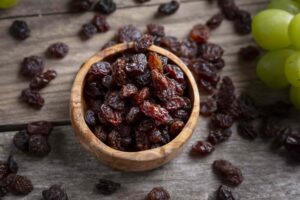Table of Contents
Raisins: A Comprehensive Guide to Their Benefits and Uses
What Are Raisins?
Raisins, often referred to as nature’s candy, are dried grapes derived primarily from Thompson seedless grapes. They undergo a drying process that may be natural (sun-dried) or artificial (water-dipped or sulfur dioxide-treated). This process concentrates their natural sugars, resulting in their distinct sweetness and dark appearance.
Not all raisins are the same. Variants like golden raisins and sultanas, which have higher antioxidant content, provide distinct flavor profiles and uses. Currants, another type of dried grape, are tangier and smaller, offering versatility in recipes.

Raisins: A Comprehensive Guide to Their Benefits and Uses
Nutrition Facts of Raisins
Raisins pack a punch of nutrients in a small size. Here’s what you get in a typical 1.5-ounce (43 grams) serving:
- Calories: 129
- Carbohydrates: 34.1 g
- Fiber: 1.9 g
- Sugar: 28 g
- Protein: 1.4 g
- Potassium: 320 mg
- Iron: 0.77 mg
- Magnesium: 15.5 mg
Notably, raisins are free of saturated fat and cholesterol, making them a heart-healthy snack.
Health Benefits of Raisins
1. Improved Oral Health
Contrary to their sticky texture, raisins may aid oral health. Their natural compounds, like oleanolic acid, suppress bacteria that cause cavities and gum diseases. Research has shown their potential in promoting healthier gums.
2. Enhanced Digestive Function
Raisins are rich in both soluble and insoluble fiber, making them an excellent aid for digestion. They help prevent constipation and promote regular bowel movements.
3. Blood Pressure Management
Daily consumption of raisins has been linked to reduced systolic blood pressure levels. Their high potassium content supports cardiovascular health and reduces the risk of strokes.
4. Diabetes-Friendly Snack
Studies show raisins help lower post-meal glucose levels, making them a great alternative to processed snacks for individuals managing type 2 diabetes. They also provide sustained energy without spiking insulin levels.
5. Cancer Prevention
Raisins are loaded with antioxidants, which combat harmful free radicals. Including them in your diet may reduce the risk of digestive system cancers.
How to Incorporate Raisins into Your Diet
Raisins are versatile and can enhance various dishes. Here are some ideas:
- Mix them into oatmeal or yogurt for a naturally sweet breakfast.
- Add them to salads for a chewy texture and sweetness.
- Use them in baked goods like muffins and bread to retain moisture.
- Create homemade trail mix by combining raisins with nuts and seeds.
Store raisins in a cool, dry place to maintain freshness. Refrigerating them can extend their shelf life up to a year.
Risks and Considerations
Despite their benefits, it’s important to consume raisins in moderation due to their high sugar content. Overeating can lead to unwanted calorie intake. Additionally, sulfite-treated raisins may trigger allergies in sensitive individuals. Opt for organic, sun-dried varieties when possible.
Conclusion
Raisins are more than just a snack; they’re a powerhouse of nutrients that can significantly improve your health. Whether you’re looking to boost your fiber intake, manage blood pressure, or simply enjoy a naturally sweet treat, raisins are an excellent choice. Just remember to enjoy them in moderation for maximum benefits.